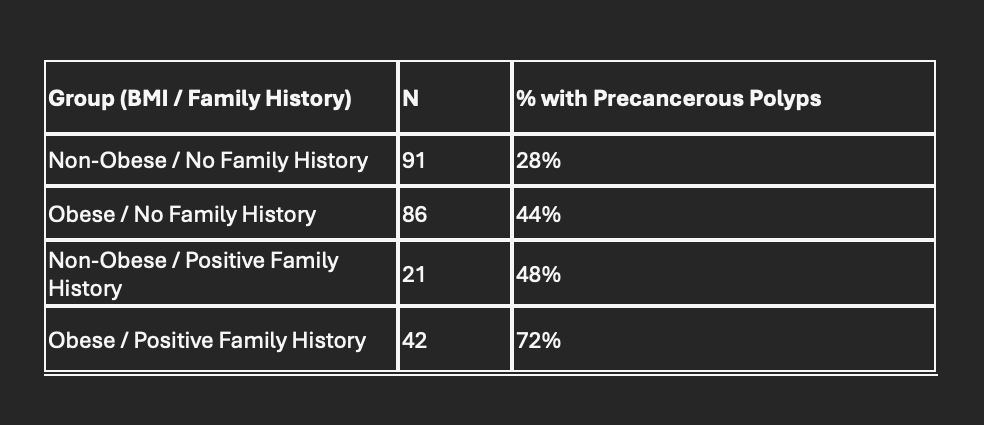Monday Poster Session
Category: Colorectal Cancer Prevention
P2603 - Combined Effect of Obesity and Family History on Risk of Precancerous Colonic Polyps: A Retrospective Cohort Study
Monday, October 27, 2025
10:30 AM - 4:00 PM PDT
Location: Exhibit Hall

Abdullah Hafeez, MD (he/him/his)
Landmark Medical Center
Woonsocket, RI
Presenting Author(s)
Abdullah Hafeez, MD, Omar Alkasabrah, MD, Dhruvi Sanikommu, MD, Tanuj Sharma, MD
Landmark Medical Center, Woonsocket, RI
Introduction: Obesity and a family history of colorectal cancer (CRC) are well-established independent risk factors for colonic neoplasia. While their individual roles are well-documented, the combined effect on the development of precancerous colonic polyps is less defined. This original retrospective study investigated whether the coexistence of obesity and family history has a synergistic association with colorectal polyp risk.
Methods: This cohort study was conducted at Landmark Medical Center between 2023 and 2025, analyzing 341 adults who underwent colonoscopy. After excluding cases with missing body mass index (BMI) or family history data, 240 patients remained for final analysis. Patients were stratified into four groups based on BMI (< 30 vs. ≥30) and family history (positive vs. negative). The primary outcome was the presence of at least one precancerous polyp. Multivariate logistic regression with an interaction term was used to evaluate associations, adjusting for age, sex, and comorbidities.
Results: Precancerous polyps were identified in 43% of the cohort. The highest prevalence (72%) occurred in obese patients with a positive family history, compared to 28% in non-obese patients without family history (p < 0.001). Obesity (OR 2.13; 95% CI 1.21–3.73; p = 0.009) and family history (OR 2.00; 95% CI 1.01–3.95; p = 0.046) were independent predictors. A significant interaction effect between the two variables was also observed (p = 0.02).
Discussion: The co-occurrence of obesity and a positive family history of CRC significantly increases the risk of precancerous colonic polyps. These findings underscore the potential benefit of incorporating both BMI and familial risk into CRC screening models. While current guidelines rely primarily on age-based criteria, our results support the development of risk-adapted strategies that may warrant earlier or more intensive screening in individuals with both risk factors. Such approaches could enhance early detection, reduce interval cancers, and improve allocation of preventive resources. Larger multicenter studies are needed to validate these findings and guide future screening recommendations.

Figure: Table. Impact of Obesity and Family History on Precancerous Colonic Polyp Prevalence

Figure: Table. Multivariate logistic regression analysis
Disclosures:
Abdullah Hafeez indicated no relevant financial relationships.
Omar Alkasabrah indicated no relevant financial relationships.
Dhruvi Sanikommu indicated no relevant financial relationships.
Tanuj Sharma indicated no relevant financial relationships.
Abdullah Hafeez, MD, Omar Alkasabrah, MD, Dhruvi Sanikommu, MD, Tanuj Sharma, MD. P2603 - Combined Effect of Obesity and Family History on Risk of Precancerous Colonic Polyps: A Retrospective Cohort Study, ACG 2025 Annual Scientific Meeting Abstracts. Phoenix, AZ: American College of Gastroenterology.
Landmark Medical Center, Woonsocket, RI
Introduction: Obesity and a family history of colorectal cancer (CRC) are well-established independent risk factors for colonic neoplasia. While their individual roles are well-documented, the combined effect on the development of precancerous colonic polyps is less defined. This original retrospective study investigated whether the coexistence of obesity and family history has a synergistic association with colorectal polyp risk.
Methods: This cohort study was conducted at Landmark Medical Center between 2023 and 2025, analyzing 341 adults who underwent colonoscopy. After excluding cases with missing body mass index (BMI) or family history data, 240 patients remained for final analysis. Patients were stratified into four groups based on BMI (< 30 vs. ≥30) and family history (positive vs. negative). The primary outcome was the presence of at least one precancerous polyp. Multivariate logistic regression with an interaction term was used to evaluate associations, adjusting for age, sex, and comorbidities.
Results: Precancerous polyps were identified in 43% of the cohort. The highest prevalence (72%) occurred in obese patients with a positive family history, compared to 28% in non-obese patients without family history (p < 0.001). Obesity (OR 2.13; 95% CI 1.21–3.73; p = 0.009) and family history (OR 2.00; 95% CI 1.01–3.95; p = 0.046) were independent predictors. A significant interaction effect between the two variables was also observed (p = 0.02).
Discussion: The co-occurrence of obesity and a positive family history of CRC significantly increases the risk of precancerous colonic polyps. These findings underscore the potential benefit of incorporating both BMI and familial risk into CRC screening models. While current guidelines rely primarily on age-based criteria, our results support the development of risk-adapted strategies that may warrant earlier or more intensive screening in individuals with both risk factors. Such approaches could enhance early detection, reduce interval cancers, and improve allocation of preventive resources. Larger multicenter studies are needed to validate these findings and guide future screening recommendations.

Figure: Table. Impact of Obesity and Family History on Precancerous Colonic Polyp Prevalence

Figure: Table. Multivariate logistic regression analysis
Disclosures:
Abdullah Hafeez indicated no relevant financial relationships.
Omar Alkasabrah indicated no relevant financial relationships.
Dhruvi Sanikommu indicated no relevant financial relationships.
Tanuj Sharma indicated no relevant financial relationships.
Abdullah Hafeez, MD, Omar Alkasabrah, MD, Dhruvi Sanikommu, MD, Tanuj Sharma, MD. P2603 - Combined Effect of Obesity and Family History on Risk of Precancerous Colonic Polyps: A Retrospective Cohort Study, ACG 2025 Annual Scientific Meeting Abstracts. Phoenix, AZ: American College of Gastroenterology.

